#erikas internal monologue
Text
wdym your w3ight is in the triple digits...
#4nor3xia#th1nsp1ration#th1gh g@p#thiinsp0#tw ed but not sheeran#erikas internal monologue#ana buddie#i wanna lose weight#im fat and ugly#light as a feather#please make me tiny#ana meal#pro for me not for thee#i need to lose so much weight#meanspir0#mealsp0#m3ansp0#m3anspo#m3an$po#ana tips#ana bllog#ed behaviour tw#ed bullshit#i need to be weightless#tw ed diet#disordered eating thoughts#tw disordered eating#ed disorder#ed dairy#ed vent
90 notes
·
View notes
Text
Really can't get over how much the Bocchi The Rock anime transcends it's source material. Episode 5 expanded chapter 9 into a full episode with a ton of original content.
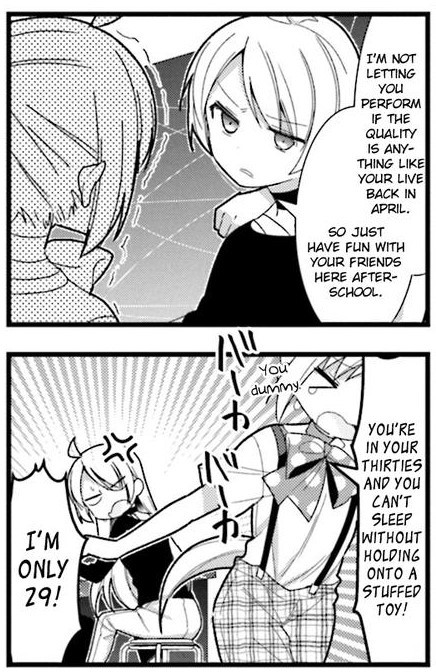
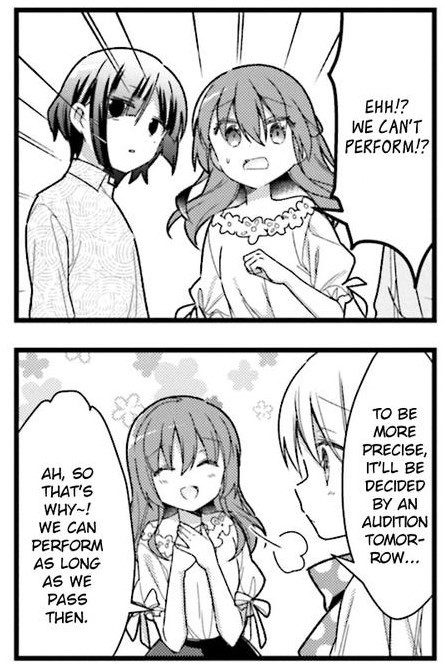
In the manga Nijika storms off and it cuts to the band talking in the practice room. Meaning this scene where they go after Nijika:
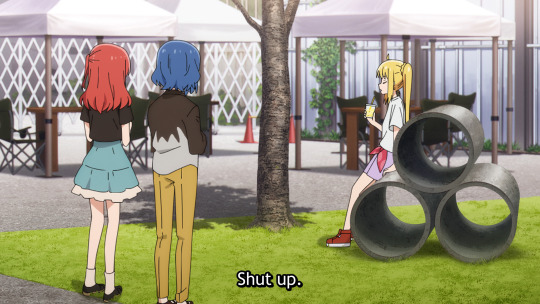
was entirely original. They moved the band's talk about the audition outside which gave some much needed variety in the scenery as this chapter in the manga takes place entirely inside Starry. Yes, that means:

this scene between Bocchi and Kita at school was also entirely original. This deepens Kita's characterization somewhat and shows off more of her relationship with Bocchi. In the manga it flows straight from talk of the audition to the wig skit. Then right after that we have this conversation between Nijika and Bocchi:
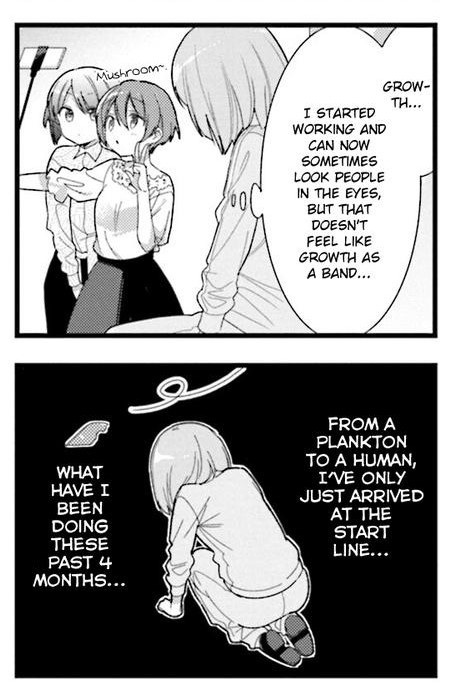

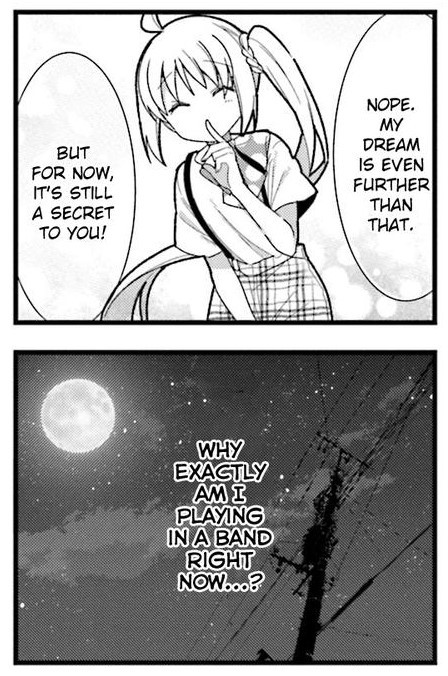
In the anime they played Bocchi's internal monologue over a montage of the characters going about their day. And the conversation between the two was expanded into my favorite scene of the episode:
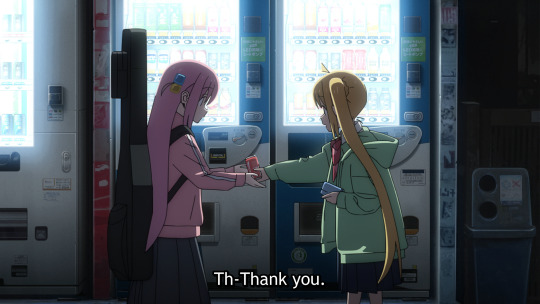
Nijika talks to Bocchi about if she forced her into the band. A topic that just wasn't touched on in the manga. Next they get into the reasons they wanted to join a band. Which plays out much like in the manga but with the slower pacing in the dialogue as usual and a much more significant feeling setting. This scene in the manga I had pretty much forgotten about but I doubt I will be forgetting the anime version.
There's a lot more changes in this episode, for example: Seika's approval of the audition was a lot more straightforward in the manga. But these were all I wanted to talk about. Incredible work from Yoshida Erika (the script writer for this episode) and the rest of the staff. They were able to turn what was only six pages into this stellar and memorable episode.
Each week I just love this anime more and more.
#bocchi the rock!#gotou hitori#ijichi nijika#yamada ryou#ikuyo kita#woah look i managed to post without mentioning my ship
712 notes
·
View notes
Text
one thing that i think is a really interesting difference between the piano teacher (the book) and the piano teacher (the movie) is that you spend A LOT more time around walter klemmer and in his head in the book than in the movie, and, in doing that, you realize that he’s just as nuts as erika kohut in many ways, but because he’s a young, healthy, conventionally attractive man, he is able to get away with it more than she is (and he KNOWS this and uses it to his advantage.)
on another note, another thing i find FASCINATING about their relationship that comes from this is, in reading klemmer’s internal monologue, you realize that he actually does want to dominate erika (i.e. choose her clothes, force her to share his opinions, “teach” her things (in order to reverse the power she wields by *actually* being his teacher)) before he plans on eventually dropping her, but then, when she expresses her own desire to be sexually dominated by him and elaborates on exactly how she wants him to do it (which DOES actually include having him choose her clothes as well as more....risqué things....) he’s put off and disgusted while at the same time, the book makes a point of saying he’s aroused by it.
i think the point that’s being made here is that klemmer (and i would suspect more than a few men irl as well...) wants to dominate and victimize women under the guise of being a “casanova” in the sensitive “soft boy” mode, but once he encounters a woman who WANTS to be dominated and victimized, he (supposedly) loses interest bc if she WANTS it and sets the terms, she’s really the one in charge and klemmer cannot have that, even if he finds himself aroused by the idea of the acts themselves.
#i also think the movie kind of makes him seem more sympathetic than he is in the book..................#the piano teacher#elfriede jelinek#text
147 notes
·
View notes
Text
With Under Night 2 coming next year I've been reacquainting myself with a lot of the gameplay mechanics and story and Orie is still my favorite character, both to play and from a storyline perspective. Namely because she's in the very interesting position of being a weirdo, but so comparatively normal next to the other freaks that are in her faction she's boring and plain by comparison.
For those that mostly just play the game and don't touch the story, Orie is not the noble, elegant justice gal she's portrayed to be in the game. That's her specifically in Licht Kreis Mode and using her Customer Service Voice.
Her Chronicle Mode goes out of its way to poke holes into the facade of her being a noble, elegant girl.
She is, in fact, an weirdo airhead that's actually kind of a slob in her private hours. She's gone on record to nearly blowing her cover in several undercover missions because she either blabbed to much about fighting monsters or let critical information slip when in social situations. She legitimately calls out Licht Kreis's noble image in her internal monologues and explains that most soldiers in the faction are former orphans with only basic social interactions (herself included) with only a handful like Kaguya and Wagner actually having a noble lineage. The original school she learned and trained at was an old building showing signs of dilapidation and neglect due to it being a school for orphans. The most she has going for her in terms of being normal is despite her airheadedness she's a very hard worker and diligent in keeping on a mask when needed, even if it cracks at times.
I can't stress enough that 90% of Orie's Chronicle Mode is her being exasperated by how freakishly weird and awkward her coworkers while barely able to keep her Normal Woman Mask on.
Compared to the actual noblewoman with zero social graces known as Erika Wagner, the ADHD Meme Machine known as Mika Returner, and Trolling, Teasing, Taunting Kaguya, Orie might as well be the peak of sanity and stability.
30 notes
·
View notes
Text
Devils Night By Penelope Douglas
My thoughts on the devils night series
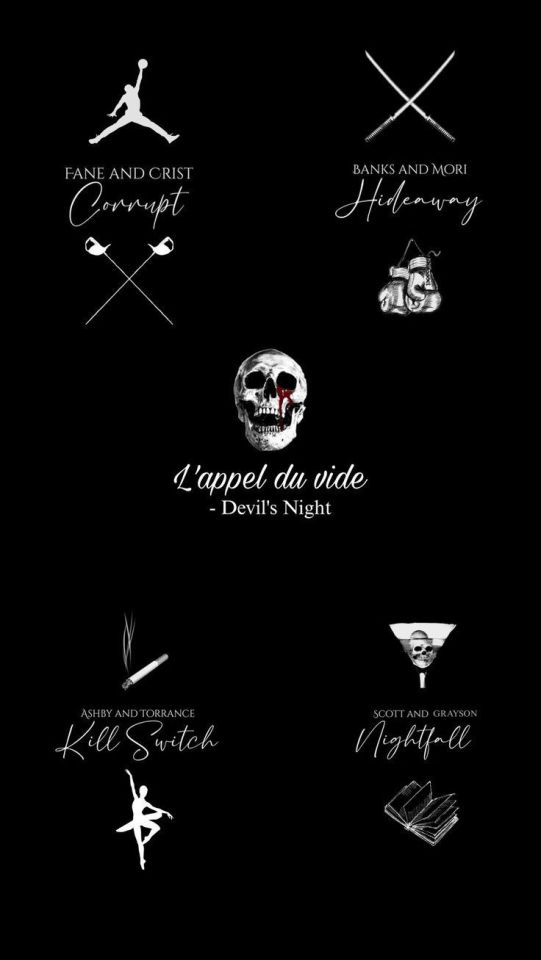

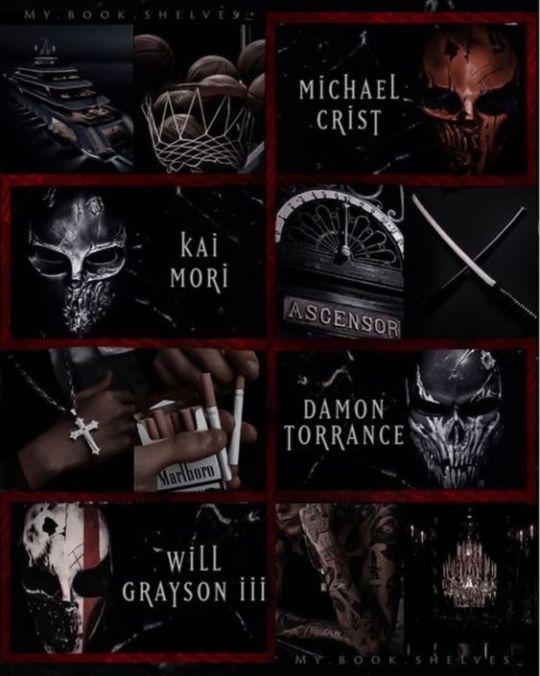
Trigger warnings: All tws from DN series, sa mention, grooming mention, this is not a positive post.
Note: Credits to @pro-logue-epi-logue for giving me the motivation to write this (girl I was about to write a whole essay in your comments) this is the first and last time I talk about this series because I swear it gives me a headache. Also, i think there might be too many heart emotes here (╥‸╥)
So, i read the DN series a while back (all the damon-winter content had me hooked and they, at least, did not disappiont but more on that later). This series was not what i expected for one, and for two i literally did not expect it to be a series at all. My opinion is probably biased based on my liked and disliked characters, if you disagree, scroll.
I'm dividing this into two different sections, the books and the characters because as a writer myself, (and someone who has analyze and review books thoroughly as her 2024 goal) i think the two deserve to be viewed separately as much as they do together. This is by no means meant to hate PD this is again just my personal thoughts on the series.
Also, I read this series some time ago, so my memory isn't very fresh. Feel free to correct me (gently).
˚ʚ♡ɞ˚ THE BOOKS ˚ʚ♡ɞ˚
ღ Corrupt [Erika Fane and Micheal Crist]
❤︎❤︎❤︎♡♡
Three stars for the first book in the series. Why? Well, to be honest, it was boring.
I think, while the book was boring, it held potential. Everything was setup nicely, and I feel like everything went just downhill from here.
Rika, at least in this book, was an okay character to me. She was a lost girl (understandably so), she wanted to live a little, get into trouble (like every highschooler in a piece of media not written by a highschooler). Even her obsession with Micheal was understandable. The plot was nice, it was mysterious, kept me hooked and didn't bore me (too much). The pace was a bit slow for my taste but by the end of the book i knew why it was slow and i enjoyed it.
The writing left a bit to be desired, but i think that that's just a me problem. I like a very certain kind of writing style which involvles a lot of deep thought from the characters and a lot of internal monologues (this style gets executed flawlessly by Trisha Wolfe, in my opinion) but I understand that characters from devil's night (at least Rika and Micheal) aren't people who'd have that kind of thought process.
Overall the book set a pretty good stage for the rest of the story to unfold. Rika felt relatable, Micheal was okay (a little dumb but he's not the brains of the group) unless of course we mention the grooming but we'll do that at a later time.
My only complain was that, in the begining the book felt very confusing but again, that might've just been me. I loved the aesthetic the story was promising and the atmosphere built by the story telling was mesmerising and immersive.
ღ Hideaway (Kai Mori and MOTHER Nikova Banks)
❤︎❤︎❤︎♡♡
Banks carried the book on her back, I said what I said and I will not be taking it back.
Anyway, so three for this book too because this book had potential but it was ruined by PD's favoritism for Erika. Listen, I understand self insert characters and even I have some in my stories and I love them more than life itself but I don't think Penelope accomplished what she wanted by shoving Rika down everone's throats.
The writing and pacing was all over the place. Rika was in scenes that had nothing to do with her and overall i think PD jumped too fast to some scenes and took way too long for some others.
The book would've been so much better if PD's editors or beta readers would've helped with the pacing. As an author myself, i understand how hard it is to not include your favriote baes in everything but that's why we have editors. So, this one I'm not holding onto to PD enitrely. (Despite the injustice Banks was done.)
ღ Kill-Switch (Damon Torrance and Winter Ashby)
❤︎❤︎❤︎♡♡
Boring ahh, virtually no plot whatsoever, my girl winter was done so dirty and overshadowed by Erika and Damon throught the entire of the book. #SoftWomenCanBeJustAsBadassAsTheCunningOnes.
This, ugh, I can't figure out if i want to put this in the books or characters. But god help me, the idea of feminism is flawed asf with this book is not great. Now, I don't know whether that idea came from PD or the fandom, but characters like Winter and Emory are constantly overshadowed by either 1. The men in their lives or 2. The other "badass" female characters (Alex and Rika, I'm so pissed because I wish I could add Banks here but my girl barely gets any screentime)
Overall, it was just Damon and Winter's love story before getting into the finally book. Not too much to say about it. I already said what I had to about the actual main character being overshadowed by Rika who, surprise, is not supposed to be the FMC of this particular book.
ღ Nightfall (Will Grayson and Emory Scott)
Warning: My opinion is going to be biased asf here because I'm someone who suffered physical abuse as a child.
❤︎❤︎♡♡♡
One star because in this book there was only 1 star, that was the star of the show, Emmy.
I'm kidding. Two stars because, yeah. This book held a lot of potential but I think either PD just doesn't work well with series or she was rushed to do this because all the potentiometer went into a fiery drain.
Actually most of everything was okay. PD could've solved the plot very easily by making Will's plan succeed but the moment Alex popped out of her little hiding spot, I cringed. So hard. (Cue me trying to keep my emotions in check while writing this)
This wasn't Alex's book and she shouldn't have been there. And I felt so SO bad for Emory throughout the entire book. I liked past Will but present Will irked me to no extent. It's like PD saw the vision of the character arc of "sunshine gone dark" but she kind of missed.
As someone who suffered emotional and physical abuse, this book was slightly triggering (grrh, Alex) but overall two stars.
One for not messing up Emmy's character and two for building good character relationships with Emmy and her two sidekicks in the story. (I forgot their name I'm sorry, Rory and Micah? Or something similar?)
The plot, the pacing, the resolving. Everything left me wanting more. It just wasn't right.
˚ʚ♡ɞ˚ THE CHARACTERS ˚ʚ♡ɞ˚
Going to try and summarise my thoughts on them with as little words as possible so I don't ramble
ღ Erika (3/5)
She was understandable at first, she could've been a great example of someone who's kind, empathetic but still can be strict when necessary but the writing of the books failed her. I can understand why she turned the way she did at the end of her arc (Micheal literally groomed her and felt insecure when he couldn't control her anymore) but I think she's a strong character despite being annoying most of the time. I like that she looked out for the girls (a little bit, before the writing failed her and she turned into a pseudo feminist pick me who thrives from male validation) Deserves to break away from Michael's grooming and become her own person.
ღ Micheal (3/5)
Boring, boring, boring. Groomer. His personality got more drained the more the books went on. Manchild.
ღ Banks (5.5/5)
One of the only two people with brains. Literal the strongest character in the series. Can't relate to her but I wish I could. She survived so much. Kai doesn't deserve her. Someone needs to make her happy, like actually. She deserved so much better than what she got.
ღ Kai (4/5)
Boring but not as boring as Micheal. Has a personality, ig. Has (some) braincells. (Thank God the asain genes didn't fail) He should've listened to what Banks went through. Does not behave like a very healthy partner from what we've read.
ღ Winter (5/5)
My baby. She deserved so much better. Underrated opinion, she's actually so strong. Takes everything life throws at her with a smile. The sweetest badass ever. I will defend her with my life.
ღ Damon (5/5)
My baby (derogatory). I'll protect him with my life but I'll punch him first. Actually probably the only guy with actual brain and the only one who wouldn't cheat on his wife, given the absolute chance (imo). Manchild (affectionate). I love to hate him and hate to love him. Call me Winter cuz I'm blind to his red flags.
ღ Emory (She's so amazing she broke my scale and I swear I can treat her better than Will)
Screaming, crying, throwing Alex against a WALL for what she did to my baby. She's so me. I understand her. She deserved better than Will but I'm glad she gets to be happy at least.
ღ Will (3/5)
He treated Emory horribly but past Will was the cutest sunshine ever. He deserved better. Manchild (derogatory). Idiot (derogatory). I'll fight him (affectionate).
[Not going to give it for Alex or Aydin becuz they're not main characters but Alex gets negative seventeen out of five because she's a bitch (no, not a bad bitch. Just a pick me bitch who told a recovering alcoholic she preferred him drunk) <33]
#I'm actually scared to tag this#what if the fandom comes after me 😭#fuck it we ball.#readingrn#Yashi reviews a book#ALSO I'M SO SORRY IF THERE ARE GRAMMAR OR SPELLING MISTAKES ENGLISH ISN'T MY FIRST LANGUAGE AND I WROTE THIS IS RECORD TIMING
6 notes
·
View notes
Text
ERIKA DE CASIER - LUCKY
youtube
Yeah, she’s lucky, but is she a star?
[7.38]
Katherine St. Asaph: I too enjoy "Boy's a liar Pt. 2" and Des'ree's "You Gotta Be."
[6]
Nortey Dowuona: Apparently, this samples both "Sailing" by Christopher Cross and "Can't Let Go" by Linda Király. It's also liquid drum and bass. Excuse me... *leaves blurb to listen underneath an oil drum, waits for 5 minutes before realizing it is empty, thinks of actually analyzing the song, remembers the 2nd line of the chorus, shrugs awkwardly, keeps listening*
[8]
Ian Mathers: YouTube comments section absolutely undefeated: I scroll down and the first thing I see is "Love the Chistopher [sp] Cross vibe going." I do get where they're coming from (WhoSampled tells me it's Linda Király instead), but if I didn't like "Lucky" what a weirdly specific diss that could be. The song always seems to be a step away from going full depressive breakcore to me, and I mean that as a compliment.
[8]
Hannah Jocelyn: "Can't Let Go" is a lost gem from the late 2000s: too sparse to stand among Darkchild's best productions (unless you're listening to the Radio Edit W/ Guitars [sic]), but Linda Király sings the fuck out of it. Elementary-school Hannah was obsessed with the song: melodrama perfect for a 4th grader grieving her first unrequited crush. I smiled big when I heard that piano show up in "Lucky", but I kept waiting for this song to explode the way "Can't Let Go" does in its chorus and it just... doesn't. Instead, it stays in a quiet register, de Casier not even phased by the breakbeats skittering around her. The production is excellent, even if I'm already getting a bit sick of the drum and bass revival, but there's no catharsis beneath the smooth synth pads and frenzied percussion. The actual song's sophistication is captivating in its own right, but the blunt force melodrama of the original is missed.
[7]
Harlan Talib Ockey: Erika de Casier throws the entire kitchen at us on “Lucky.” Between the Linda Király sample, the stuttering drums, the bass hits, the synths, and the laughs, her vocals are often overpowered. There’s logic to contrasting the busy production with her serene vocal performance, and it does prove very effective when the waves break in the chorus. However, when every element is bouncing off the walls at once in a drum and bass-inflected surge, it’s easy to lose track of the main melodic line.
[5]
Jacob Satter: de Casier's wrapped-in-velvet vocal style brings to mind pop stars who have found ways to repurpose their delicacy as stridency (Nelly Furtado), as a firm corset of gossamer support (Coco O), as an internal monologue set free (Cleo Sol), as coyly kitsch confessional (Clairo). de Casier checks a few of these boxes -- she seems content to hold the center, to be simply present in "Lucky's" swirl of juddering trap, SOPHIE-esque squeaks, and music-box nostalgia. Her patience and clarity elevate near-house muzak into something distinctly, warmly human.
[7]
Jacob Sujin Kuppermann: Somehow even more gloriously energized than the singles off Sensational – the drums feel like hail falling on a sunny day, melting immediately on contact with the song's surface. Thanks to the great NewJeans convergence event we talked a lot last year about de Casier as a songwriter, but "Lucky" is a fine reintroduction to her power as a performer: that opening laugh, the way she says "Whoa," even the slight lift as she sings "lucky" for the second time on the chorus. It's all finesse, a highlight reel of perfectly struck moments that make the ordinary trappings of "Lucky" into something sublime.
[8]
Dorian Sinclair: There's a tedious kind of social media post I'm sure we've all seen, where someone posts a lyric sheet from the '70s or '80s next to a modern one (I've most often seen it with Beyoncé's "Run the World (Girls)") to make some point about The Decline of Music Today. The lyrics for "Lucky" could make an appearance in one of those posts, but the song itself makes clear why the core argument the posts are making is nonsense. Sure, repeating the line "another night" 23 times in a 3 1/2-minute song looks lazy on paper, but in practice? Hearing de Casier's intonation changing, the piano shifting under her, the backing vocals slipping in and out of the mix? It's beautiful! And it's not beautiful in spite of the repetition of the lyrics, but because of them. "Lucky" is swoonily, overwhelmingly romantic, and getting that impact with such a deliberately restrictive set of tools takes a hell of a lot of skill.
[8]
Isabel Cole: Retro vibes — not just the tinkling piano of the sample, but a particular unabashed sweetness in both content and melody that seems less in fashion than it once was — run through just the right amount of champagne-bubble glitchiness to make it feel up to date, but not in an ostentatious way. More love songs should draw attention to the erotic potential of being a good listener.
[8]
Kayla Beardslee: “Lucky” is so delicate and conversational that at times you almost forget you’re listening to a song. Erika de Casier is one of few artists who can turn that into a good thing -- embraced by the glimmering piano line (even as it shifts focus away from the lyrics), she concentrates on feelings forming and drifting by like clouds in the sky so the rest of us don't have to, so that we can lay back instead and just feel.
[8]
Will Adams: The liquid drum and bass revival of recent tends to have a winking cutesyness about it (see the de Casier-penned "Super Shy" as but one example). It's fun to listen to, but "Lucky" pushes beyond that to reveal something darker. The arrangement is in standard skitter mode with twinkling pianos, but throughout are throbbing beat rolls, glitches, and haunting exhalations, as if the song is threatening to crumble at any moment. Even the outro -- an emotional tug of war between repeated lines "another night" and "too fast" -- forgoes a standard fade out in favor of increased distortion and tactile whispers. Behind the timid smile, a more raw emotion bubbles up to the surface.
[8]
Leah Isobel: Last year, I ended a friendship that I'd had for almost a decade. I had always known it would happen one way or another: either by the slow drift that accompanies physical or emotional distance, or by sharper, more sudden means. I chose the latter option, releasing myself from what would have been years of confused and angry longing. I'm proud of that choice. Yet, I still reminisce about what I thought our relationship was, and who I thought we both were -- to each other, to ourselves. The intensity of feeling that characterized my experience of the relationship made me feel fragile, girlish. Of course it wasn't sustainable. But it was thrilling to see how long we could sustain it; how much I could take from them while minimizing myself; how much I could give to them without them asking for any of it. How many times we could go out together, dancing, drinking, smoking, laughing on the street. On "Lucky," Erika repeats "Another night" over and over and over, each repetition surprising for the sheer fact of its existence. It's not about what's in the future, but the shock of the present staying present: day after day morphing into a zoetroped sequence of images, cycling but not moving, time itself standing still due to the horrible electricity of one-sided love.
[7]
Joshua Minsoo Kim: A lot of people in my close friend group shit on Erika de Casier, constantly pointing out that she’s a mediocre singer with unimaginative toplines. And yes, they were not slow to mention that this sounds like Des’ree’s “You Gotta Be” over a skittering beat that wouldn’t even turn heads a couple decades ago. But even though I can recognize their disdain, what keeps me coming back to de Casier’s work is the way her productions are integral to the emotional trajectory of her lyrics. You don’t understand this song without hearing that cackle and those sci-fi synths, which capture the anxiety and blissed-out possibilities of lasting romance. Indeed, this is the same artist who wrote NewJeans’ “Super Shy,” eager to define the complexities of a crush with a polysemic phrase. “I need ya another night” is repeated so often that it becomes a musical Rorschach test. Is it sweet and honest? Too forward and desperate? A sign of confidence? Of insecurity? Love will make your head spin, making you feel like all these things could be true.
[8]
[Read, comment and vote on The Singles Jukebox ]
3 notes
·
View notes
Text
NEED erika on talks to that we can find out what their internal monologue was like when chetney revealed that he knew about them being evil
16 notes
·
View notes
Text
All things considered, the episode was fine, even good in the second half. The first part was boring as expected, we spent lots of time between meetings, purriry and redundant internal monologues. Then we had the scene where we take measurements of the crush which was 🔥🔥 despite being kinda rejected in the end.
Then we see the guys in their Earth outfits and lol, I can’t complain because it could’ve been much worse, I actually think the styles suit them, I’m only a bit unhappy about Lance, he looks too much of a chav bro imo, but I see they were trying to go with a gym type of look which I guess makes sense, but I probably will never be happy with him wearing any other colour but black.
Finally, in the end we have the real interesting bit where we get to Earth, I’m soooo invested in this plotline. We see Erika’s town and house, girl was rich! Her dad seemed to be involved in some kind of shady business (what if he was the one providing humans to the vampires?), her room is a reconstruction as someone in her family didn’t forget about her. The episode ends the moment she and her crush sneak into her fake room, she’s crying in his arms and someone sees them and recognises her.
Oh and before that, she and the crush have a steamy moment in the middle of the street lol, she pushed Lance against a wall and was two seconds away to unzip his pants, finally. But sadly, not the right place, not the right time.
We are exactly halfway through the season now...
67 notes
·
View notes
Note
If you could rewrite Berserk (or maybe parts of it), what would you change? I love the way you interpret this story. The way you interpret this work, makes it so much more powerful, than how some other side of the fandom understand it.
thank you so much, i’m glad my interpretations resonate with you!
tbh my ideal version of Berserk is basically a much shorter story that begins with the Black Swordsman arc and ends on this shot:

more specifically I’d open on a similar panel of Guts fighting ghosts, seen far above, and alone. I’d include a version of the Lost Children arc in the Black Swordsman arc after chapter 2, between Snake Baron and Count Slug, also introducing Skull Knight. I’d make some kind of pointed visual comparison between Skull Knight and Vargas, illustrating that they’re both similarly consumed by revenge and cautionary tales for Guts.
This version of Lost Children is even sadder and more depressing - Jill and Rosine’s friendship is highlighted as positive, the scene where they fly together is beautiful and uplifting, and it’s suggested that if Jill did stay with Rosine her influence could remake the creepy Land of the Elves into less of a horror show and more of an actual place of refuge sans monster transformations. Yk, Rosine is open to Jill’s suggestions basically.
Guts still has his humanizing moments with Jill but he’s shown at his most monstrous too when he kills Rosine. Jill returning to her abusive home isn’t uplifting or hopeful, it’s tragic. Guts’ “this is your paradise” bit isn’t an objective statement, it’s a sign of Guts’ depressed cynicism and increasingly monstrous mindset. Oh and despite the Land of Elves being fucked up (in my version it would at least be sliiiiightly less fucked up), Guts destroying it would have some thematic echoes in the destruction of the Hawks. Maybe the raid we see on the Hawks after they’re declared traitors involves a lot more fire and forest burning down. Maybe some of the elf monster kids try to save each other and one of them gets Guts with a thrown knife lol a la Judeau protecting Casca. Idk, something.
Also the Peekaf story is cut, as is Rosine’s tragic flight home, as emotional as it was in the manga. She dies with Jill here. I’m kinda downplaying the dreams as escapes theme wrt Jill’s flight with Rosine and the land of the elves because I don’t think it works in this arc due to, yk, the alternative being abusive homes.
Afterwards ghosts still taunt Guts about becoming like Femto, but without the “your friend” description bc that gives too much away. Skull Knight picks up Rosine’s behelit and has his suggestive “hm this could be Guts eventually” internal monologue even though Guts doesn’t have a behelit yet.
Count Slug arc is essentially the same. I would turn the fetus into some kind of pathetic looking misshapen dog demon (like the Beast of Darkness but in much less cool form, bc that’s essentially what the fetus was before Miura overwrote it) who follows Guts around and reminds him of what he’s in danger of becoming. Guts picking up Slug’s behelit is the last shot before the Golden Age begins.
Theresia is a more angry version of Jill, and they’re both examples of Black Swordsman Guts ruining lives wherever he goes, along with the zombie girl in chapter 2 - it’s all variations on a theme of Guts sort of creating mini versions of himself bc of his traumatized lashing out. Zombie kid is most metaphorical in becoming a monster after listening to Guts’ cynical take on dying by the sword; Jill goes back to her abusive Gambino-esque father when her potential escape, Rosine, is killed; Theresia swears vengeance when Guts kills her father who couldn’t sacrifice her to save himself.
(this mini me thing would parallel Slug and Rosine’s abilities to create their own monsters, btw. Cycle of violence kinda thing.)
Everything else follows the manga up until Guts and Casca start getting romancey. I’d cut that out completely. They can have a burgeoning friendship but there’s no romantic undertones and no sex and no meddling Judeau etc. Casca still fights Guts and stabs him and yells at him about Griff but there’s no sucide attempt. She still confesses to her crush on Griffith because it’s a good griffguts parallel, but definitely doesn’t say she was lying to Guts and herself when she said she wanted to be Griffith’s sword. But I do want that “Griffith’s not a god... and I am a woman” line in there because it’s such a good parallel.
Guts monologues about his newfound dream to Godo in a flashback during the Wyald fight instead, then does the waterfall log thing and breaks several bones, then gets told off by Erika who points out he just wants to fight Zodd again. I’d maybe move some of Godo’s lines about Guts metaphorically being a nicked sword to here too. Also show the dragonslayer leaning up against a wall lol.
Guts still tells Casca at some point that he fully intends to leave again. Maybe during the rescue mission. Because yk we still need that moment where Griffith overhears someone telling Guts to leave.
Finally the last change is that Casca dies with Judeau, Guts manages to survive until Femto wakes up, they have a moment staring each other down, there’s a clear parallel to a moment of Guts’ childhood - I’m thinkin Guts asks “Why?” and there’s a shot of Femto, shadowed so we only see one eye, a la:

Apostles begin to descend on Guts chanting shit like ‘sacrifice’ and ‘ours,’ (comparison to bb!Guts facing down the wolves btw, Guts is resigned) and then Skull Knight appears and rescues him and we get that last shot of Femto.
The End.
The implication is that Guts and Griffith are alone and monstrous without each other, violence begets violence, relationships are a positive contrast to that but they keep fucking those up, etc. There would still be a slight ray of hope though in comparisons to Jill/Rosine and Slug’s inability to sacrifice Theresia, and Femto lowering his hand, showing that, yk, even monsters have potential. It would be a very thin ray though bc Guts killed those monsters lol so the implication would still be that Guts is kind of doomed to roam the world alone with his sword like Skull Knight or Zodd.
Also... I’d fuck around with the world building and astral plane stuff because Guts and Femto being metaphysically separated doesn’t work for this. I want that thin ray of hope even if it necessarily comes to nothing lol, if only because if I was alternate universe Miura I’d want people to write Femto/apostle Guts fanfic. So no mention that the Godhand can only appear when someone uses a behelit, maybe even imply somehow that Femto could show himself to Guts at any time, he’s just snubbing him.
Anyway yeah, ty for asking.
also if you’re interested I once wrote a very long and involved post here about what I’d change if I had free range to adapt Berserk if you want a longer answer with more details that follows the actual story much more closely (including a less involved take on my answer here lol).
12 notes
·
View notes
Text
<i>thomas mann buddenbrooks< i>, and <i>georg lukacs - buddenbrooks characters gradesaver

The Problematical Nature of Decline in Thomas Mann's Novel "Buddenbrooks" - ProQuest - thomas mann buddenbrooks 100 german must-reads
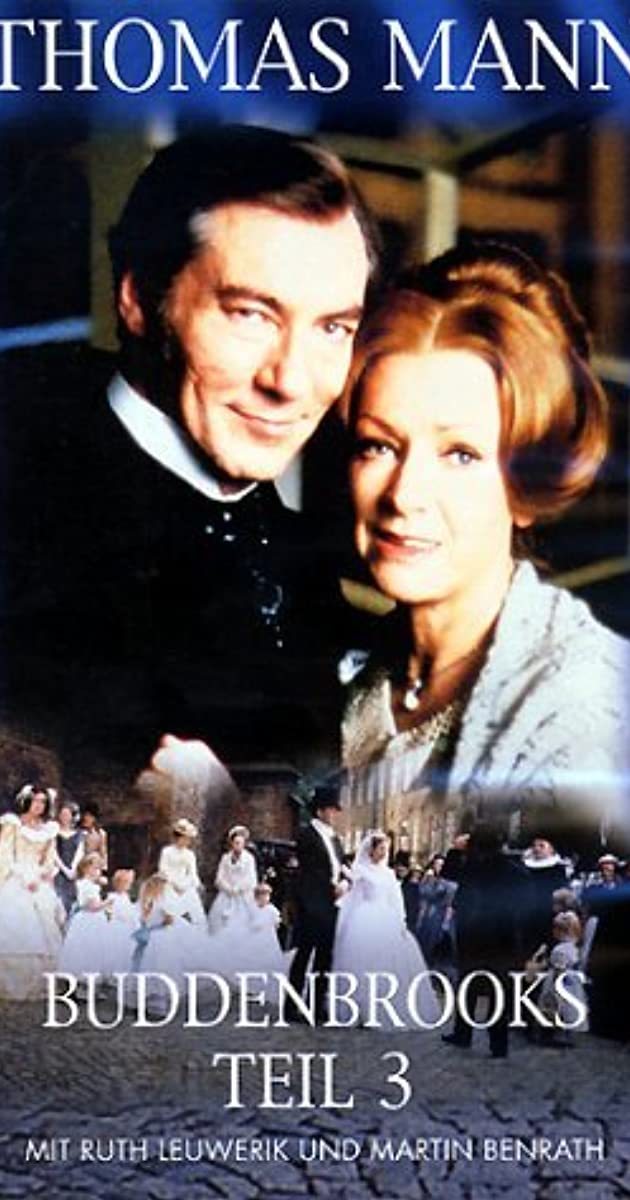
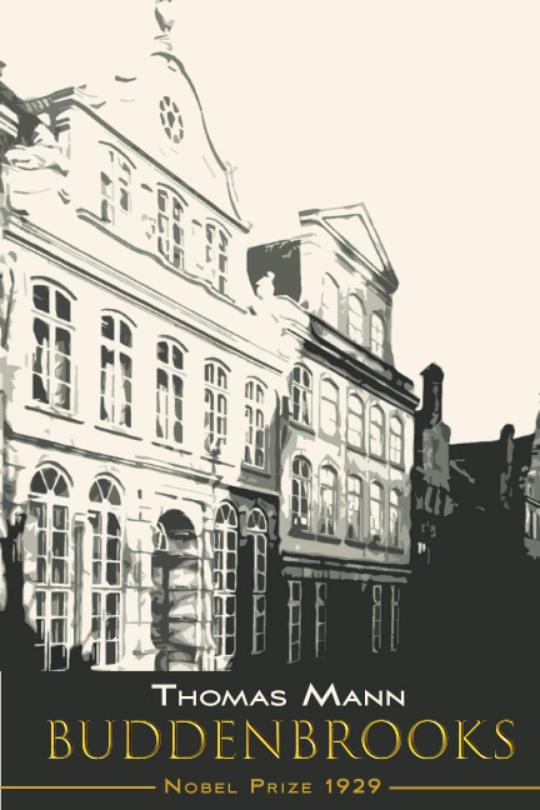
Buddenbrooks Themes GradeSaver. Buddenbrooks is a 1901 novel by Thomas Mann, chronicling the decline of a wealthy north German merchant family over the course of four generations, incidentally. Sometimes they even used an over-drawn pronunciation by way of making fun of themselves and each other, and relished their clipped phrases and exaggerated vowels with the same heartiness they did their food.". Buddenbrooks Summary & Study Guide. Failure, decline and even death seem to be the only viable outcome. Buddenbrooks was their first project. It met with mixed reviews when it was published in 1924 but, as Mann grew popular through Lowe-Porter's translations of his other works, it was picked up and republished in hardcover by the Modern Library and in paperback as a Vintage edition. For many years it was ubiquitous. Successfully runs the family business, represents a change in direction with his interest in fashion consciousness, public affairs and high culture. Unlike the other characters, Thomas does not inherently like his son. Permaneder visits and proposes to Tony, which she accepts despite his coarseness.
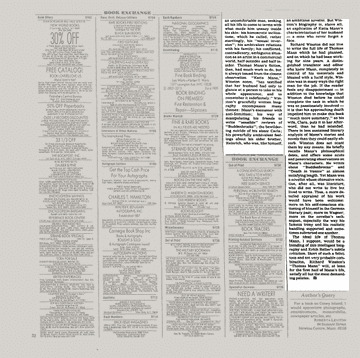
Thomas Mann 'Buddenbrooks'
Little Johann Hanno Buddenbrook : buddenbrooks summary supersummary
Buddenbrooks Literary Elements GradeSaver : essays for buddenbrooks
Buddenbrooks analysis
His wife says, You cant believe how he looked when they brought him in. Teil was released in 1959, and Buddenbrooks 2. Thomas Mann mentions the outer world only when it relates directly to events in the Buddenbrook family. Flags fly from every house when the Buddenbrooks. Buddenbrooks, analysis of the novel by Thomas Mann. Thomas Mann Buddenbrooks The Decline of a Family (Buddenbrooks Verfall einer Familie) Summary by Michael McGoodwin, prepared 1997. Johann and Elizabeth begin to become closer to their religion in their old age. Johann maintains intact the business and wealth he has inherited from his father, and the Buddenbrook name is held in high esteem. Life that is full of complexity, contradictions and ambiguities. Gotthold is the half-brother of Johann III. Gerda and Thomas are even able to produce an heir to the Buddenbrook family, Hanno. An editor will review the submission and either publish your submission or provide feedback. The poet Hoffstede celebrates with a romantic verse. It is not until they discuss life and politics, particularly the reality of sitting on the stones, that Tony begins to see things from an external perspective. Duty,Pride, And Merit In Thomas Manns Buddenbrooks. Johann III and Elizabeth later have another daughter, Klara. Thomas Mann 's novel Buddenbrooks was written in the manner of a wide, unhurried narrative with a mention of many details, with a detailed depiction of individual episodes, with a multitude of dialogues and internal monologues. The fate of the Buddenbrook family is a story of a gradual decline and decay. The antics of Christian only serve to further tarnish the Buddenbrooks social standing.
Thomas Mann's first novel depicts the decline of a patrician merchant family in 19th-century Lubeck. The action of the novel ranges from 1835 to 1877, and. The novel Buddenbrooks was written by Thomas Mann in 1901. He was born in 1875, soon after the unification of Germany. He wrote several books, short stories, and essays for which he was awarded the Nobel Prize in Literature. With the advent of World War II, Mann left Germany and lived the rest of his life in San Diego until his death in 1955. Analysis of Thomas Manns Stories Literary Theory and. Erika, now grown up, marries Hugo Weinschenk, a manager at a fire insurance company, and delivers a daughter, Elizabeth. When Aschenbach recognizes Tadzios ill health, he thinks that Tadzio will most likely not live to grow old. Christian regularly complains of his strange illness and gains a reputation in the town for being a drunk, a liar and a womanizer. Derived from his admiration for the operas of Richard Wagner, in the case of Buddenbrooks an example can be found in the description of the color blue and yellow, respectively of the skin and the teeth of the characters. Review of Buddenbrooks - Graham Stull. This contradiction is also seen in each of the figures in the novel. Yet as much as he was inspired by real life, he forcefully altered these biographical details to place his unique literary mark on his writing. Pastor Sievert Tiburtius of Riga proposes (1856) and marries Clara. In the later works, however, the protagonists dread their own aging, eventually creating young-old death masks for themselves, masks that, ironically, turn out to be their death masks.
Analysis of Thomas Manns Stories : buddenbrooks summary book reports
He is withdrawn and melancholic and gets bullied by other children. These notes were contributed by members of the GradeSaver community. Buddenbrooks, analysis of the novel by Thomas Mann. People were initially shocked over "Buddenbrooks" in Lubeck, but now, Thomas Mann stands tall in the city. Never having the initial heartbreak of losing his young wife, Johann III is very supportive and loving toward his children, despite the fact that he is somewhat of a hard man. When the Great War broke out in August 1914, Thomas Mann, like so many people on both sides of the conflict, was exhilarated. Finally, the era of decadence that he had anatomized in Death in Venice had come to an end; finally, there was a cause worth fighting and even dying for, or, at least when it came to Mann himself, writing about. Mann. (335) Indeed, it is Tony, forever obsessed with Buddenbrook prestige and duty, that manages to keep the family together, encourage the other Buddenbrooks to maintain the family name and reputation. Buddenbrooks is a 1901 novel by Thomas Mann, chronicling the decline of a wealthy north German merchant family over the course of four generations, incidentally. Mann (Thomas) Buddenbrooks Summary - McGoodwin. Thomas, expecting to follow his father into the family business, leaves school to join his father. Its a matter of decorum, its simply bad taste. Aschenbach, still made up into a youngold man, dies in Venice of the cholera.
Buddenbrooks Summary. One by one, the Buddenbrooks are laid to rest under their large memorial slab in a graveyard that borders on a copse of trees. As a result, his later protagonists, as they expand their worldviews, begin to synthesize humanism, culture, and philosophy, and through these protagonists, one sees, always, Manns ironic observations of the world. German Literature - Buddenbrooks - Google Sites. Antoine Buddenbrook Antoine or Tony is the daughter of Johann III and Elizabeth. Buddenbrooks Summary & Study Guide. Thomas Mann. This Study Guide consists of approximately 37 pages of chapter summaries, quotes, character analysis,. The rest of the council panics while Johann tries to calm them down, saying that the mob will leave soon. In the end, though, she yields to pressure from her father, and marries Grunlich, against her better judgment, in 1846. Buddenbrooks study guide contains a biography of Thomas Mann, literature essays, quiz questions, major themes, characters, and a full summary and analysis. About Buddenbrooks Buddenbrooks Summary.
0 notes
Audio
Bliss Nova is synesthetic synth-pop: lush, pop-driven synthonies swimming in technicolor funk grooves, stirring hooks of psychedelic electronica and dreamy waves of chilled vapor.
Brothers Daniel and Joel Trzcinski started the project in late 2014 as a way to put some lofi bedroom pop demos to good use — what ultimately became their 2015 EP, Do You Feel. The debut drew comparisons to the likes of Washed Out, Neon Indian and Toro y Moi, and the band was lauded as “one of the top promising artists from the Midwest scene.”
From 2016 on, the band developed their multi-aesthetic live show, “a tapestry of ethereal electronic soundscapes set against an explosive and booming rhythm,” and embarked on short-run regional tours, while finding time to explore slicker, dynamic dance-pop with the release of the EP Light & Shadow and the double A-side “Say It” / “Now” in 2017.
After two years of writing and recording, their 2019 full-length album, Going Places, culminates in smoggy, nostalgia-tinged euphoria awash with vintage sparkle, channeling a dreamy internal monologue entwined with the spirit of French philosophy. Longtime collaborator Brennan Willis of Ohio Recording Company co-produced and mixed the record, while mastering legend Dave Cooley (J Dilla, M83, Blood Orange) gave it a sonic polish. Erika Spring (Au Revoir Simone) makes a guest appearance, lending vocals to “Blind.”

With the new-age aesthetic of Brian Eno and Gondry-esque surrealism, the album’s ethereal splendor marks the freshest findings of Bliss Nova’s sonic evolution. Late ‘70s grooves grind against hints of early ‘80s electro funk and cosmic jazz, while timbres and textures of ‘80s ambient soundscapes and ‘90s electronica merge with ‘00s neo-soul and r&b. A supernova of samples, field recordings, lush percussion and catchy pentatonic tropes shimmer on the surface, with murkier depths and humor underneath. The Trzcinski brothers’ Bliss Nova philosophy truly is Going Places and moving a swelling congregation of their own followers in the process.
"On February 28, 2016, we started a demo called "Going Places." Bliss Nova had put out our debut EP the year prior, made up of the first 6 songs we'd written for the band — which itself had started as a survival attempt in the wake of our previous band's abrupt dissolution. On the other side of that release and off to a slow start of a new year, we were asking ourselves "Now what?"
Daniel recorded the demo in a bootleg version of Logic Pro and used his roommate's Walmart-brand electric and bass guitars. The song itself was plodding and moody and about not going places (that's what it's like to be in the Midwest in the winter, after all). We thought it had something worth developing but ultimately it went back on the shelf (that's oftentimes what it's like to be a musician, after all).
Links
Twitter
Instagram
Facebook
Spotify
YouTube
0 notes
Text
"whats 3dtwt like?"

#th1nsp1ration#th1gh g@p#thiinsp0#tw ed but not sheeran#erikas internal monologue#ana buddie#i wanna lose weight#im fat and ugly#light as a feather#ana tips#ana bllog#ed behaviour tw#ed bullshit#i need to be weightless#im cryin#tw ed diet#disordered eating thoughts#tw disordered eating#ed disorder#ed dairy#ed vent#ed but not ed sheeran#fat#fatsp0#ana friend#⭐️vation goals#i need to lose so much weight#m3anspo#please make me tiny#ana meal
51 notes
·
View notes
Text
The Leftovers – Wrapping This Up for Myself
I finally finished viewing The Leftovers earlier this week, and today while doing my weekly housecleaning I finally listened to the podcasts that I was putting off in order to avoid spoilers. Now here are my thoughts divided by which podcast helped me organize them:
The First one – the interview between Matt Zoller Sietz and Damon Lindeloff.
I find myself most excited by the Matt focused episodes each season, as did Matt Zoller Sietz. And part of what is so exciting, is I never get used to how much I like Christopher Eccleson and Matt Jamison. Eccleson has one of those faces that always looks severe in still photographs, but is irresistibly animated and exuberant in video. Matt often seems really annoying when the focus isn’t on him, but when the story is about him, I am really into his spiritual journey. (And, in the sense that what you like the best says more about you than about it, his episodes appeal to my sense that I can be more dogmatic about things than I like to admit.)
I felt that the first two seasons’ episodes about him (1x3 “Two Boats and a Helicopter” and 2x5 “No Room at the Inn”) were really rollercoaster rides in a way that I didn’t feel about 3x5 “It’s a Matt, Matt, Matt, Matt World”. I think strong reason is that this episode takes place mostly on a boat, where the other two go back and forth from different settings. But that’s part of the point, because, while the first two episodes throw up a barrage of conflict, they don’t test his faith as the third does. He ends up confronting a man who claims to be God (and maybe is?). Unlike the first two episodes there really isn’t something to cheer for about Matt in this episode. We know his quest is foolhardy and futile, which is why the fact that he has given it up by the next episode, that feels earned. (The thing he needs, but doesn’t want, is to start facing his own mortality or how his attempts to give meaning to his life aren’t working.)
I was really glad to hear Lindeloff talk about the narcissism of the characters. While this discussion was about Matt, why his actions in Season One could be so intolerable and how by Season Three they alienated his wife. The narcissist label can apply to most of the characters. Kevin Sr.’s Season Three plot would have been absolutely intolerable if the series actually agreed that what he was doing could stop the apocalypse. It was already pretty monstrous, still I liked how in the audiotape of young Kevin Jr. he bungled explaining John Hinkley, Jr’s assassination attempt of president Reagan in a way that Junior confuses it with the plot of Taxi Driver. That felt so right.
The Second One- An interview with Carrie Coon for Variety
For whatever reason, I have always found Nora hard to warm up to. Maybe it’s just because she’s going around with an unimaginable loss. Maybe it’s just that she doesn’t want to open up. But listening to these podcasts really made me appreciate what the show does with her.
It was really interesting that one of the only times Coon questioned Lindeloff about what her character does was when she left Kevin in season two and took Mary and Lilly. Coon’s concern was that Nora was too scared of her history at that point to bring anyone with her. I didn’t have a problem with that because Kevin was clearly more of a threat to other people than she was, but I didn’t have to be in Nora’s “maybe I’m a lens” headspace as Coon did.
Speaking of which, it’s interesting that Nora’s attempts to make sense of what she’s been through don’t allow her the same room for making it all about her the way that the male characters do. If she indulges in the thought, “these disappearances happen because they are close to me” she is giving herself a terrible power. If she doesn’t, she insists that the Great Departure was a once-in-a-lifetime event, can never happen again. This is a way of saying her pain is greater than anything anyone else can go through. It is what made the argument between Nora and Erika in season two so powerful, and made realizing that they had reconciled by season three welcome.
I love the fact that Coon decided for herself whether or not Nora lies in the finale and refuses to tell other people her decision.
The Third One - I really miss the Vulture TV podcast. I’m catching up on a lot of others, so I don’t miss the time it takes to listen to it, but I think they had really interesting conversations.
As someone who really liked the first season and thought it was the most accessible, I bristle a bit when I hear comments about how the show “course corrected.” As I said, I missed the younger generation of Garveys as their screen time diminished season by season. (I take their absence as a sign of their resilience. They can recover and move on in a way that doesn’t fit with what The Leftovers is.) Also, the first season’s main plot takes place over a year, while each of the following seasons takes place in a couple of weeks, baring flash backs and flash forwards. The second season in particular feels like a thriller with everything happening so quickly.
I also really like the Guilty Remnant. It’s hard to explain, but as someone who frequently thinks she isn’t feeling what she’s supposed to be feeling, the concept of a group that insists on only feeling one way and dictates that everyone feel that way appeals to me, especially because they’re kidding themselves. Indulging in a feeling doesn’t freeze things into something static. It changes them, and it actively blocks out other feelings that will always be there desepite the attempt. (See: Gladys begging for her life while being stoned to death, and Laurie’s reaction when Jill tries to join.) I like the fact that they don’t talk and they pretend that they’re all on the same page, but they’re not. If there was any doubt about that, everything Meg does in season two blows that up.
The Guilty Remnant decreases their screen time, but they’re more internalized than gone. Think of how little Nora smokes in season one versus how much more she does in season three. Or that for Kevin in both “International Assassin” (2x8) and “The Most Powerful Man in the World (and His Identical Twin Brother)” (3x7) the alternate reality that Kevin visits has the Guilty Remnant as a major political party. (That actually feels true to life in some unfortunate ways.) So while the Guilty Remnant could sometimes feel like a metaphor for overwhelming, negative feelings, over the course of the series, it’s like the cult get reabsorbed into the feelings that created them.
None of that got discussed in the podcast. I just wanted to bring it up because of how Matt Zoller Seitz reframed those two episodes about Kevin. As I said in the beginning, the episodes that I felt most engrossing with tended to be about Matt, so the “Kevin crossing over” episodes didn’t do as much for me. He emphasized how much of a white, male, cop idea of purgatory they were and compared the episodes to a James Bond movie. He also said that before the finale he was more inclined to see them as the afterlife as it exists in the show’s universe, but afterwards he was more inclined to see it as a “trauma dream.” However surreal they are, they’re also pastiches of action adventures and thrillers. The episodes arguably say more about him than about the universe of the show. (Remember, Kevin isn’t in every episode and is barely in some episodes.)
The focus on Kevin’s crossing over episodes was discussed mostly in contrast with Nora’s crossing over story. Nora’s is told in monologue, not dramatically enacted as is Kevin’s, but also the feel is entirely different. If her story were shown, it wouldn’t feel like an action movie. One of the people on the podcast, Boris Kachka, mentions that his editor interprets Kevin’s story as about not knowing how to respond to strong women. I had never thought of it that way. Most of the time when I thought about gender and The Leftovers it was asking, “Why are the most prominent members of The Guilty Remnant female?” But, I like this approach because it focuses on how Kevin envisions himself in a story where he has more agency than in the regular plot of the show. Nora mostly has to resist trying to turn her life into a story because it’s too sad and almost any resolution, except the story at the end, would feel false.
The season bookends with episodes titled “The Book of Kevin” and “The Book of Nora” but only The Book of Kevin is being drafted in the plot. People want to see Kevin as messianic. They don’t know what to make of Nora. She is a lot more determined to insist on her interpretation than is Kevin. Matt starts to draft The Book of Kevin without Kevin’s knowledge, but he write an obituary of Nora as a Mad Libs for her to play. It’s sweet.
The tension between needing to assign meaning to what happens and needing to let go isn’t strictly divided along gender lines. Some characters go between the two extremes, Laurie is most notable in this respect. But it eases things for me.
#the leftovers#Vulture TV Podcast#Podcasts#Remote Controlled with Debra Birnbaum#kevin garvey#nora durst#matt jamison#laurie garvey#the guilty remnant#the sudden departure#links roundup
2 notes
·
View notes
Text
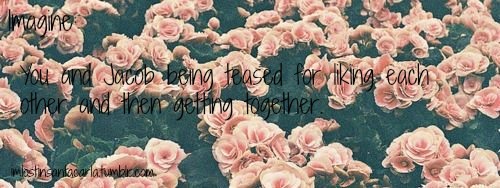
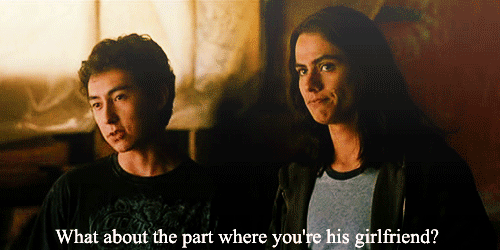
Not my gif. Gif credit goes to the amazing creator.
@stephenie-mkm said: "Dating Jacob include imagine" where all the pack are teasing you two for liking each other and then you and jacob finally anounce that you are an official couple?😊💕 Can be a long one?💋💋
A/N: This is so freaking cute! They’d all be sooo smug and just done with Jacob’s continuous internal monologue about his crush! Thank you for requesting, hope you enjoy what we’ve come up with, love! - Admin Erika 💖 & Admin Kat 💟
Imagine: You and Jacob getting teased for liking each other and then getting together.
There was a series of wolf calls and ‘whoops!’ as the pack bundled into Emily’s kitchen, playfully bumping into each other, whilst throwing sarcastic remarks and jokes around like it was as easy as breathing.
Sam was stood comfortably beside Emily, whom was in the process of making enough scrambled eggs to feed a whole entire army. In a way, that’s precisely what she was doing.
“So, (Y/N), have you and Jacob finally got to the part where you’re dating?” Quil barks obnoxiously at the pair of you.
You blushed and looked down, murmuring a negative.
“Ohh, leave them alone!” Emily interjected, bringing over a mighty steaming bowl of scrambled eggs. “They’re happy.” she continued with the sugariest of grins.
The boys dove right in, grumbling away like barbarians. Jacob had wandered over to the table, gracefully grabbing two plates, in which he piled them up with food. His eyes found yours, his head motioning towards the door, to which you followed him happily out into the backyard.
Whilst yourself and Jacob ventured towards a pile of big rocks, talking along the way, you found yourself feeling evidently more and more carefree. The food upon your plates was consumed in between the very rare moments of silence; to which much more of your truth’s were confessed and exchanged.
It was always effortless to be Jacob’s friend, and your heart fluttered as you thought of the possibilities.
After all, life was full of them. No one knew what was five seconds away, let alone in the future.
At some point or another, your conversation decided to wander another way, - once the plates became vacant and bare, and set to one side within the long untamed grass-; Jacob’s mammoth hand reached out towards you, taking your hand within it’s heat:The heat a silent plea for you to look into his eyes, to which abashed-ness took hold and you freed your frail hand out of his grasp.
“What, I can’t hold your hand?” he stated suddenly, that sunrise grin sweeping across his features.
You frowned. “No, you can. I just don’t know if it holds the same meaning for me.”
Jacob eyes glinted with something you couldn’t identify, and he straightened up. “Okay, well, tell me something,” he began. “You like me, right?” He smirked triumphantly.
A blush scolded your cheeks, you nodded contently.
His expression then changed. It took a firm grasp upon seriousness now, and he scooted closer to you. “I have something to tell you, (Y/N). You need to know the truth.” He paused, meeting your gaze as he said levelly, “I don’t like you the same way that I used to...” he broke off at the end, your heart sunk abruptly.
Your heart was beating out a wild tattoo against your chest, and you were sure that your cheeks were robbed of all color. Suddenly, everything other than Jacob seemed much more welcoming.
The unexpected transformation of your countenance drew fright from the young werewolf, startling him into an explanation: “Wait! It’s not what you’re thinking, okay?!” he rambled on clumsily. “I mean, things have changed, but not like that! I mean, I love you and al-”
Somehow, you managed to find the words that were right there, on the tip of your tongue. “I’m in love with you too.”
Before you had much time to think, Jacob had composed himself and surged forward, claiming your lips with his in a searing kiss. ‘Words are for losers anyway’s.’ as he stated to himself mentally.
As you broke apart, breathlessly, you heard Emily calling you and Jacob. It was time for the pack to have a meeting, leaving you to help Emily with the Lonely Mountain of Dishes.
The pair of you walked back in silence, bringing along the plates you’d abandoned in the grass, and before long, you reached the kitchen.
As you rounded the corner, Embry silently noted how happy you both looked.
“Hey, (Y/N), did you get to the part where you’re his girlfriend?” Quil leered.
You and Jacob looked at one another as you hung on the precipice, before Jacob reached out and took your hand again, smiling at you. “We doing this?”
“Yeah!” You smiled, feeling self-conscious but happy, contented.
The pack whooped, and if you saw the glint of metal and the blanch of crinkled notes exchange hands, then you would be aware of who in the pack won or lost bets.
How were you to stop them? They’d only been waiting for forever.
Please keep requesting imagines! If you like it, follow for more.
#jacob#jacob imagines#imagines#jacob black#jacob black imagines#twilight imagines#twilight jacob#twilight jacob imagines#twilight jacob black#twilight saga#twilight saga imagines#twilight saga jacob#twilight jacob black imagines#twilight saga jacob black imagines#fluffy imagines#this was heartwarming
302 notes
·
View notes
Text
Welcome to positiviteeny!
Messages of hope, support, and inspiration!
In 10 minutes or less.
I’m a random anonymous person on the internet, who is missing the fact that an episode wasn’t released, and needs to get some stuff out.
The thing I’d like to get off my chest is: you know how sometimes you have that internal monologue about your emotions? I get that, like, a lot. And I have never really found a good way of managing it. It always feels wrong to let it out of you because you know that its wrong too, or that its too self-deprecating, or just a little too honest. Like, its not worth it to let that out of you, its not worth it to let that out into the world or onto somebody else whether that be a significant other, a friend, or just a stranger. That’s not really an okay thing to do in society. And so I think that we take those monologues and we internalize them. We take that raw, self-deprecating, too honest thoughts and we make them true for ourselves. Even if they are not. And when they are true maybe that is the most dangerous because then we don’t let go. We don’t let it out and then it just sits in us and its hard to tackle that beast, to conquer that thought. To rise above it. To rise above your own flaws about yourself. I think to do so is the root of confidence and we could all use a little bit more it. “We” being the good natured and whole-heartedly compassionate and empathetic people that listen to this podcast, not the narcissistic meanie heads in this world. But, even still, its hard. Its hard to rise above them. And...[I’m sorry that I don’t have a lesson like Travis, Amy, and Erika normally do. I’m not exactly a positive person yet, I just, wanted to say this] sometimes that’s all there is too it.
Here is a struggle that we all have and never talk about. Here is a moment where we all face our fears about ourselves, where we see just how “not good” we truly are. This is when we figure it out. And it’s difficult. And it’s hard. And it’s there. But it isn’t going away. It won’t go away. So don’t act like it will, don’t pretend like it will. Face it. Challenge it. Prove it wrong or cast it aside or just accept that its there and that you don’t want to do anything about it. But know that its there, it won’t go away, and that you have to make a decision about it.
0 notes
Link
A TV show made by art students!!
Genius
I like the simplicity of the shots and the editing, episode three gets a lot of content out of a dark room. I like the economy of it, a really simple way of getting away without having to make too many props and such.
“The field of gallery-specific video art carries a set of conventions which defines a range of outcomes within it. This genre is identifiable by features of a direct monologue, fragmentary narrative, shoddy special effects, disjunctive editing, amateur actors, extended takes, play with exposure and duration, and allusions to popular media modes of the past.1 This latter convention drew us to the supernatural investigation dramas of the 1990s. The TV shows within this genre–think Twin Peaks, The X-Files, Buffy the Vampire Slayer–are marked by serialised storytelling, monster-of-the-week episodes, government conspiracy, smouldering tension between leads, Emmy bait special episodes, and reboots and rip-offs.2The video artist Dara Birnbaum, who rose to prominence in the 1970s with work appropriating television content, said of her practice: “I wanted to use video on video...television on television”.3 Single-channel video distribution has the advantage of increased accessibility to a more diverse range of audiences. Single-channel, unlike multi-channel, does not require a sophisticated installation to be presented outside the gallery, worldwide, and can utilise languages innate to television viewers. Recent moving image practices have shifted towards the spectacular, destination viewing in staged site specific, gallery environments.4 In Bella and Theo: Detectives of Crime, the serial videos that make up Avoiding Climax take both modes of distribution. Each episode in the series airs on a twice weekly schedule within the Window space or are available to be viewed anytime, on Window’s online space, as are the shooting scripts.Avoiding Climax is a response to the recent battlefield of on-demand streaming services, and to the resistance shown by certain established international broadcasters to engage with the full-season release strategy. In line with that, it is a response to the proliferation of viewer-supported reboots and the rise of DIY video culture through youtube and other streaming services. The web-series is a contemporary answer to the 1950s studio freeballing that allowed untested talents such as Edward D. Wood Jr to break through, albeit with significantly less budget.”
Brakhage, Stan. A Moving Picture Giving and Taking Book. West Newbury, MA: Frontier, 1971. Print.
Cook-Wilson, Winston. “Why the New ‘Twin Peaks’ Will Save Reboot Culture.” Inverse. N.p., 24 Feb. 2016. Web. 30 June 2016.
Demos, T. J. Dara Birnbaum: Technology/transformation: Wonder Woman. London: Afterall, 2010. Print
Balsom, Erika. Exhibiting Cinema in Contemporary Art. Amsterdam: Amsterdam UP, 2013. Print.
0 notes